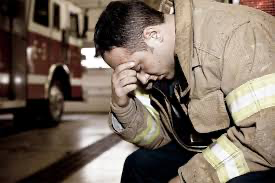Department leaders say they recognize that post-traumatic stress and other mental health issues are among the biggest dangers of the job.
For more than a decade, Sam Buser watched the lights of fire trucks bounce off the city streets of Houston, heard the roars of burning blazes and stood before the caskets of too many firefighters.
He never held a hose or kicked in a door, but, as senior psychologist for the Houston Fire Department, he spent many sleepless nights at fire stations.
His job was to convince those who run toward the fire that it’s okay to help themselves. But for much of his career, he was something of a rarity in Texas. Even as resources have been poured into law enforcement agencies for decades to solve well-publicized mental health issues, the same can’t be said for fire departments.
The reasons are simple: There isn’t enough money to go around at many cities or volunteer jurisdictions, and many fire departments have not been ready to drop their stigma around mental health.
“With the primary focus placed on law enforcement, there must also be a recognition that the needs of the fire service are different, and the programming and training should reflect that,” said Leonard Chan, a contributing author of First Responder Mental Health: A Clinician’s Guide. “The taboo for seeking mental health services has been tempered, but this really depends on the department and individual firefighter.”
But lately, advocates say, more departments are seeing the need for that kind of work. And in some big city and suburban departments, along with in the Texas Legislature, small steps are being taken to address firefighters’ mental health needs.
The problem
The danger — and fear — brought by rushing into a fire is well-known. But firefighters spend the majority of their time responding to emergency medical service calls that can involve suicides, abuse, shootings, fatal car accidents, major weather events, and other distressing incidents that can also take a toll on someone’s mental health.
Data suggests that those mental tolls are some of the biggest dangers of the job. According to the Firefighter Behavioral Health Alliance, more firefighters die from suicide each year than in the line of duty, and many additional suicides are likely unreported.
A Dallas Fire-Rescue Safety Division resiliency survey found that 8% of that big-city department’s firefighters thought about committing suicide at some point in their careers. The national average for suicidal ideation is 4.9%, according to the National Institute of Mental Health.
Still, studies show many firefighters will mask their mental health challenges until it’s too late.
The Texas Commission on Fire Protection, the primary regulatory body over the state’s fire service, reported this year in their annual injury report only 1% of firefighters reported a psychological injury.
Dr. Sara Jahnke, the director and a senior scientist with the Center for Fire, Rescue & EMS Health Research, a nonprofit research firm, said the awareness of mental health needs came into focus about a decade ago and only became a central talking point in the last five years.
“I think we have underestimated the mental health impact of being on the job for firefighters,” she said. “9/11, in particular, put the stress of the tasks firefighters have to do on center stage.”
But, she added, the bravado around firefighters still discourages some from seeking help. Firefighters, who are 95% male, say there’s an intense feeling of team among departments, and nobody wants to be considered the “weak link” of the group.
Many fear that if anyone finds out about a mental health need, they might get reassigned or fired altogether because they are deemed no longer reliable.
“So when a firefighter says, gee, I’m depressed, or I have post-traumatic stress disorder, what happens is their fellow firefighters start to wonder, maybe I can’t count on this one,” Buser said. “Maybe if we go into a fire, this person is going to freak out, and they’re not going to be able to help.”
When Dallas firefighters were surveyed, they reported concern that the creation of a counseling center in or around a fire station and would focus more on checking a box than helping members.
“While there is progress, there remains a bravado around being a firefighter that discourages some from reaching out for help,” Jahnke said.
But Hutto Fire Chief Scott Kerwood, who has been fighting fires for 45 years, said fire departments have begun to get serious about mental health this past decade.
“When I started, you didn’t talk about anything like this,” he said. “It’s just like, ‘Suck it up, kid, and just do your job.’”
Kerwood said he remembers a push in the 1980s to get mental health services into fire departments, but there was a strong distrust of that notion back then.
“We see some pretty nasty stuff. But we tend to internalize that and say, well, it’s just part of the job,” he said. “You’re not a macho firefighter if you’re having trouble dealing with what you’re seeing on the job.
“But then the suicides started happening, and everybody went ok, let’s figure out what is going on.”
The departments are beginning to get outside help, too. Lawmakers unanimously passed House Bill 2143 in 2019, which allows first responders to receive workers’ compensation for post-traumatic stress disorder caused by one or more instances at work.
But smaller departments, including many volunteer departments, lack the financial resources to provide the same offerings.
“Unfortunately, it all comes down to money and support,” Jahke said. “Strong mental health programs require funds and effort.”
Changing the culture
The Oklahoma City bombing in 1995 was the start of a broader recognition of the mental health tolls on the job. A study done 34 months after the disaster showed the rising alcohol disorders among the rescue workers.
The Houston Fire Department was one of the first departments in the country to hire a full-time psychologist in 1999. Buser’s friend, who worked at the Baylor College of Medicine, created the position after studying how people cope after a major disaster.
Buser took over the position 13 years ago when his friend died.
“When he died, they provided him a firefighter funeral, which is rarely ever given to a civilian, but they were there with their fire trucks and hundreds of firefighters in uniform. He had done a tremendous job of gaining acceptance within the department,” he said.
Tania Glen, who runs a mental health clinic specializing in treating first responders and veterans in Central Texas, said when she started 30 years ago, she met a lot of resistance from the entire public safety community.
“I was poked fun at quite a bit just for choosing this line of work. You know, it was an uphill battle, but what I saw underneath all the skepticism is all the trauma,” Glen said. “I saw all the angst, and I saw the divorces and dysfunction.”
Changing the culture is a significant undertaking, but progress is happening in places like the Cedar Hill, which created the First Responder Resiliency Coalition to help firefighters get mental health assistance. The program was designed seven years ago as a grant-funded initiative to provide mental health resiliency education to firefighters and inform them how to form peer support in their fire departments.
Story said he has already seen the culture change in their fire department.
“We’re at a point now where if something does get missed, we have people asking why,” he said. “Why did somebody not check on this person? Why did somebody not make a referral? Did anyone see any signs? So we’ve done a lot of things to really kind of put notifications in place.”
The program has now expanded into providing free advocacy, grant writing assistance, quarterly resiliency meetings and critical incident response guidance to cities nationwide.
Concepts like peer-to-peer support groups have also found success in fire departments across the state, allowing firefighters to convince each other to get help.
“It has been exciting to watch because I think the new wave is affecting the older generation and inspiring them to get help,” said Leah Belsches, current staff psychologist for the Houston Fire Department. “I love seeing people who have been with the department for 20 to 30 years come in for the first time asking for help.”












